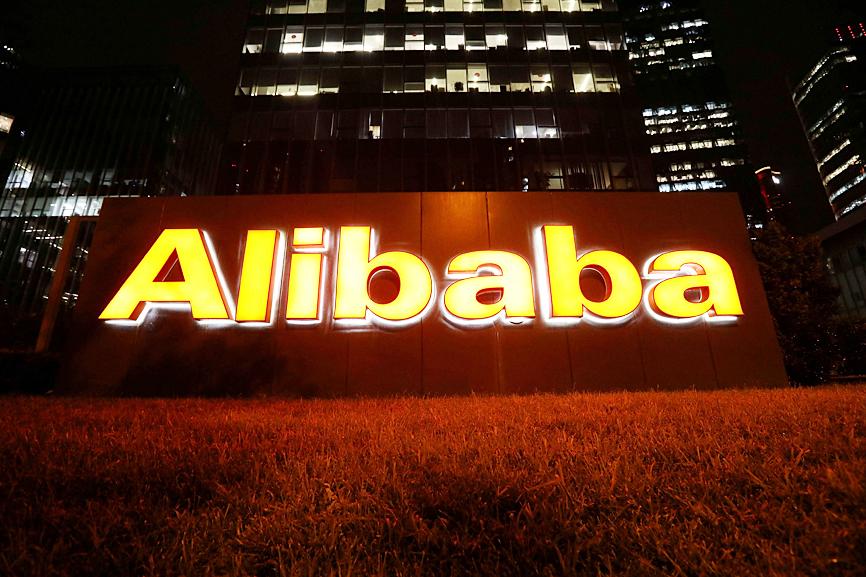A consortium led by Alibaba Group Holding Ltd (阿里巴巴) has emerged as the frontrunner to take over Tsinghua Unigroup Co (清華紫光), a deal that could fetch more than 50 billion yuan (US$7.8 billion) to help keep China’s indebted chip champion afloat.
The Chinese government is leaning toward the Alibaba-led offer given the e-commerce giant’s financial heft and the potential synergies with its own cloud and semiconductor business, people familiar with the matter said.
The consortium, which includes funds backed by the Zhejiang Provincial Government, is edging out several competitors for Beijing-based Unigroup, several other people said, asking not to be identified as the information is private.

Photo: Reuters
A successful deal could help avert one of China’s biggest potential corporate failures, while securing for Alibaba valuable chip know-how and a supply of semiconductors to fuel the country’s largest cloud computing platform.
While the transaction is expected to be completed as soon as next month, negotiations are ongoing and details on timeline, deal size and a final buyer could still change, they said.
Billionaire Jack Ma’s (馬雲) empire is mostly known for its e-commerce leadership, but the Hangzhou-based firm that he cofounded has in the past few years made enormous headway into computing and last month unveiled one of the country’s most advanced chips.
A deal could help Alibaba score points with Beijing, which punished the e-commerce giant for monopolistic behavior, but also wants to reduce its reliance on the US for chips.
Any deal is likely to include conditions for restructuring more than 100 billion yuan of onshore and offshore debt that Unigroup has, another person familiar with the discussions said.
Alibaba representatives had no immediate comment, while a Unigroup spokesperson did not immediately respond to requests for comment.
Aside from the Alibaba-led consortium, several state-backed companies, including semiconductor investment fund JAC Capital (建廣資產管理), Wuxi Industry Development Group Co (無錫產業發展集團) and Beijing Electronics Holding Co (北京電子控股) also weighed bids, the people said.
The Beijing-based company, which is affiliated with China’s Tsinghua University, remains a linchpin in a race for technological supremacy with the US.
The Chinese semiconductor titan last year defaulted on a bond and in July a court ordered it to overhaul its debt, prompting it to invite strategic investors with deep pockets as well as the capability to run a major chip-making and cloud business.
Confidence that Unigroup’s distressed assets would not get left in limbo grew after a debt-workout plan in May for its peer, Peking University Founder Group Corp (北大方正集團).
Under the plan, Founder, which is linked to another of China’s academic institutions, is to receive billions of dollars from strategic investors, including a state-owned property developer.

CHIP RACE: Three years of overbroad export controls drove foreign competitors to pursue their own AI chips, and ‘cost US taxpayers billions of dollars,’ Nvidia said China has figured out the US strategy for allowing it to buy Nvidia Corp’s H200s and is rejecting the artificial intelligence (AI) chip in favor of domestically developed semiconductors, White House AI adviser David Sacks said, citing news reports. US President Donald Trump on Monday said that he would allow shipments of Nvidia’s H200 chips to China, part of an administration effort backed by Sacks to challenge Chinese tech champions such as Huawei Technologies Co (華為) by bringing US competition to their home market. On Friday, Sacks signaled that he was uncertain about whether that approach would work. “They’re rejecting our chips,” Sacks

NATIONAL SECURITY: Intel’s testing of ACM tools despite US government control ‘highlights egregious gaps in US technology protection policies,’ a former official said Chipmaker Intel Corp has tested chipmaking tools this year from a toolmaker with deep roots in China and two overseas units that were targeted by US sanctions, according to two sources with direct knowledge of the matter. Intel, which fended off calls for its CEO’s resignation from US President Donald Trump in August over his alleged ties to China, got the tools from ACM Research Inc, a Fremont, California-based producer of chipmaking equipment. Two of ACM’s units, based in Shanghai and South Korea, were among a number of firms barred last year from receiving US technology over claims they have

It is challenging to build infrastructure in much of Europe. Constrained budgets and polarized politics tend to undermine long-term projects, forcing officials to react to emergencies rather than plan for the future. Not in Austria. Today, the country is to officially open its Koralmbahn tunnel, the 5.9 billion euro (US$6.9 billion) centerpiece of a groundbreaking new railway that will eventually run from Poland’s Baltic coast to the Adriatic Sea, transforming travel within Austria and positioning the Alpine nation at the forefront of logistics in Europe. “It is Austria’s biggest socio-economic experiment in over a century,” said Eric Kirschner, an economist at Graz-based Joanneum

OPTION: Uber said it could provide higher pay for batch trips, if incentives for batching is not removed entirely, as the latter would force it to pass on the costs to consumers Uber Technologies Inc yesterday warned that proposed restrictions on batching orders and minimum wages could prompt a NT$20 delivery fee increase in Taiwan, as lower efficiency would drive up costs. Uber CEO Dara Khosrowshahi made the remarks yesterday during his visit to Taiwan. He is on a multileg trip to the region, which includes stops in South Korea and Japan. His visit coincided the release last month of the Ministry of Labor’s draft bill on the delivery sector, which aims to safeguard delivery workers’ rights and improve their welfare. The ministry set the minimum pay for local food delivery drivers at